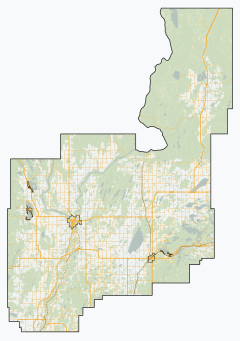Athabasca County
Athabasca County | |
|---|---|
 Welcome sign | |
Major communities | |
 Location within Alberta | |
| Country | Canada |
| Province | Alberta |
| Region | Northern Alberta |
| Planning region | Upper Athabasca |
| Established | 1947 |
| Incorporated | 1959 (County) |
| Government | |
| • Reeve | Brian Hall |
| • Governing body | Joe Gerlach
Natasha Kapitaniuk Ashtin Anderson Tracy Holland Gary Cromwell Kelly Chamzuk Rob Minns Camille Wallach |
| • CAO | Bob Beck |
| • Administrative office | Athabasca |
| Area (2021)[2] | |
| • Land | 6,111.3 km2 (2,359.6 sq mi) |
| Population (2021)[2] | |
• Total | 6,959 |
| • Density | 1.1/km2 (3/sq mi) |
| Time zone | UTC−7 (MST) |
| • Summer (DST) | UTC−6 (MDT) |
| Website | Official website |
Athabasca County is a municipal district in north central Alberta, Canada. It is located northeast of Edmonton and is in Census Division No. 13. Prior to an official renaming on December 1, 2009, Athabasca County was officially known as the County of Athabasca No. 12.[3]
Geography
[edit]Communities and localities
[edit]|
The following urban municipalities are surrounded by Athabasca County.[4]
|
The following hamlets are located within Athabasca County.[4]
|
The following localities are located within Athabasca County.[5]
- Localities
|
|
Demographics
[edit]In the 2021 Census of Population conducted by Statistics Canada, Athabasca County had a population of 6,959 living in 2,832 of its 3,746 total private dwellings, a change of -11.6% from its 2016 population of 7,869. With a land area of 6,111.3 km2 (2,359.6 sq mi), it had a population density of 1.1/km2 (2.9/sq mi) in 2021.[2]
In the 2016 Census of Population conducted by Statistics Canada, Athabasca County had a population of 7,869 living in 3,067 of its 4,093 total private dwellings, a 2.7% change from its 2011 population of 7,662. With a land area of 6,124.43 km2 (2,364.66 sq mi), it had a population density of 1.3/km2 (3.3/sq mi) in 2016.[6]
| Visible minority and Aboriginal population (Canada 2006 Census) | |||
|---|---|---|---|
| Population group | Population | % of total population | |
| White | 6,650 | 87.7% | |
| Visible minority group Source:[7] |
South Asian | 0 | 0% |
| Chinese | 15 | 0.2% | |
| Black | 35 | 0.5% | |
| Filipino | 20 | 0.3% | |
| Latin American | 0 | 0% | |
| Arab | 15 | 0.2% | |
| Southeast Asian | 25 | 0.3% | |
| West Asian | 0 | 0% | |
| Korean | 0 | 0% | |
| Japanese | 15 | 0.2% | |
| Visible minority, n.i.e. | 0 | 0% | |
| Multiple visible minority | 0 | 0% | |
| Total visible minority population | 125 | 1.6% | |
| Aboriginal group Source:[8] |
First Nations | 310 | 4.1% |
| Métis | 500 | 6.6% | |
| Inuit | 0 | 0% | |
| Aboriginal, n.i.e. | 0 | 0% | |
| Multiple Aboriginal identity | 0 | 0% | |
| Total Aboriginal population | 810 | 10.7% | |
| Total population | 7,585 | 100% | |
See also
[edit]- List of communities in Alberta
- List of francophone communities in Alberta
- List of municipal districts in Alberta
References
[edit]- ^ "Municipal Officials Search". Alberta Municipal Affairs. May 9, 2019. Retrieved October 1, 2021.
- ^ a b c "Population and dwelling counts: Canada, provinces and territories, and census subdivisions (municipalities)". Statistics Canada. February 9, 2022. Retrieved February 9, 2022.
- ^ Province of Alberta. "Order in Council (O.C.) 563/2009". Retrieved December 6, 2009.
- ^ a b "Specialized and Rural Municipalities and Their Communities" (PDF). Alberta Municipal Affairs. June 3, 2024. Retrieved June 14, 2024.
- ^ "Standard Geographical Classification (SGC) 2006, Economic Regions: 4813044 - Athabasca County No. 12, geographical codes and localities, 2006". Statistics Canada. March 5, 2010. Archived from the original on March 8, 2012. Retrieved August 11, 2012.
- ^ "Population and dwelling counts, for Canada, provinces and territories, and census subdivisions (municipalities), 2016 and 2011 censuses – 100% data (Alberta)". Statistics Canada. February 8, 2017. Retrieved February 8, 2017.
- ^ Community Profiles from the 2006 Census, Statistics Canada - Census Subdivision
- ^ Aboriginal Population Profile from the 2006 Census, Statistics Canada - Census Subdivision


